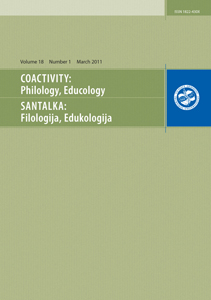Analysis of Practical and Academic Application for Knowledge of Lanquage for Specific Purposes
Analysis of Practical and Academic Application for Knowledge of Lanquage for Specific Purposes
Author(s): Lina RutkienėSubject(s): Social Sciences
Published by: Vilnius Gediminas Technical University
Keywords: academic application of knowledge; questionnaire; extralinguistic factors; language for specific purposes; practical application of knowledge.
Summary/Abstract: The article examines the methods applied by graduate master’s degree students of the Faculty of Civil Engineering of Vilnius Gediminas Technical University for the purposes of using knowledge of language for specific purposes in the work and study environment. Their linguistic situation is ambivalent: they act in the academic environment, and therefore the used language has to meet academic requirements; on the other hand, most of them are adapting to the linguistic environment at work. Thus, master’s degree students are able to view the subject of language for specific purposes and the knowledge and skills gained from a practical perspective. With the help of a questionnaire and an interview, the article is aimed at assessing the experience of applying the knowledge gained by the students who completed a course on language for specific purposes 2–5 years ago. The article analyses both academic and practical applications regarding knowledge of language for specific purposes. Extralinguistic factors are taken into account when examining why employed master’s degree students do not always use what they have learnt. The problems of the practical application of knowledge are closely related to the cultural situation; hence, the relevant issues of the postmodern epoch are discussed. The paper explores the interconnection of the practical application of knowledge that covers economic and political factors and globalisation. The study focuses on the academic application of knowledge about the language for specific purposes. Attention is paid to dangers posed for the youth language by the predominance of information technologies in higher education institutions. The article analyses how employed master’s degree students evaluate the course on language for specific purposes and the linguistic revision of MA theses, as well as explores how the knowledge provided meets their needs.
Journal: Santalka: Filologija, Edukologija
- Issue Year: 22/2014
- Issue No: 1
- Page Range: 89-96
- Page Count: 7
- Language: English

